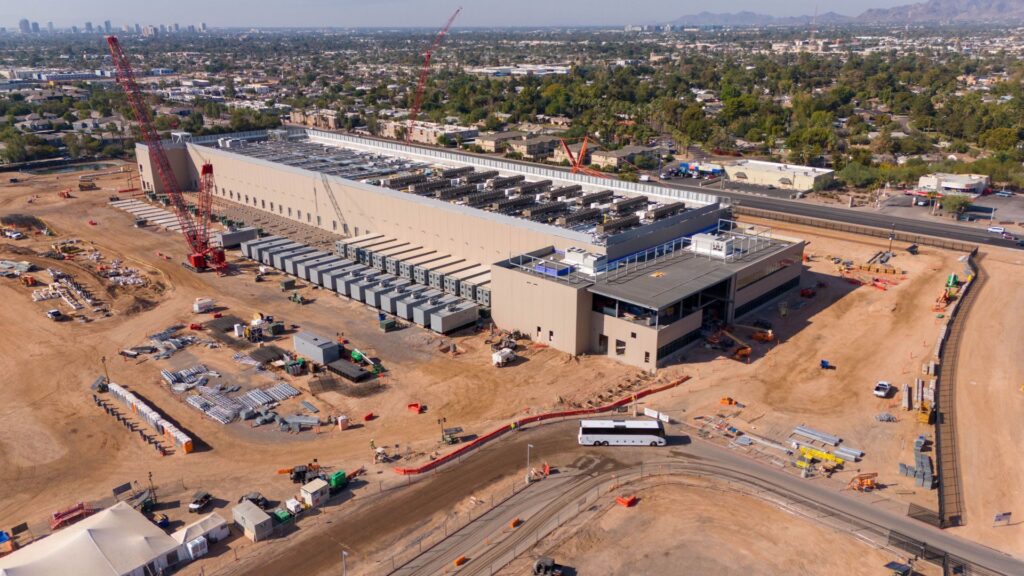
From Power Plants to Processors
Private Equity's Big Bet on the Data Center Pipeline
October 31, 2025
The rush to power AI through utility takeovers poses uncertain payoffs and significant public costs.
The expansion of the digital sector, catalyzed by the proliferation of cryptocurrency and artificial intelligence (AI), has led to explosive growth in data center expansion and a frenzy around potential increased power generation demands. Despite speculation that the AI craze is mere hype with clearer risks than benefits, and that it’s coalescing into a bubble primed to pop, private equity firms are at the forefront of the AI frontier. Private equity firms have been pouring record amounts of capital into the digital sector, investing in over 450 data center companies since January 2022. Private equity firms have spent nearly $200 billion on data center deals and have been behind 80 to 90 percent of completed mergers and acquisitions in the data center-related industries in the past three years.
Because of the AI boom, data center infrastructure and power generation appear to be in high demand among investors, spurring private equity acquisitions of existing power plants, cancelling retirement plans for coal and older gas-fired power plants, proposing new power plants, and even acquisitions of vertically integrated retail energy utilities. For example, BlackRock and Blackstone already invest in or wholly own retail energy utilities that customers depend on for their critical needs. Both firms have deals in process that, if successful, could put nearly 11 million captive energy customers at the mercy of private equity firms across the United States, the United Kingdom, and El Salvador for their essential energy needs.
BlackRock, through its subsidiary Global Infrastructure Partners (GIP), recently received final approval for a $6.2 billion acquisition of ALLETE Inc., the parent company of Minnesota Power, a retail energy utility directly serving about 150,000 customers in Northern Minnesota. But Minnesota utilities appear to be only the beginning for BlackRock’s GIP; the firm is aiming higher with plans for the largest utility infrastructure takeover of all time. BlackRock’s GIP has proposed a $38 billion take-private acquisition of AES, one of the largest publicly traded utilities in the country. While BlackRock eyes critical public energy infrastructure, Blackstone has also acquired companies throughout the entire AI supply chain, including energy utility infrastructure.
While Negative Health and Climate Impacts Are Clear, Actual Energy Demand Remains Speculative
Private equity firms already own or invest in at least 159 fossil fuel power plants globally, with at least 8 in development. Burning fossil fuels at power plants causes harmful emissions that can have serious impacts on public health and on the environment. Despite the public health and environmental harms caused by polluting assets currently in private equity firm portfolios, the private equity industry is focused on increasing gas power generation for data centers, even though some of the initial demand forecasts may be too high.
The projections of the energy needed to supply the digital sector build-out due to the acceleration of AI vary widely, with uncertainty lying within the rapidly evolving AI sector itself. While a recent study by the U.S. Department of Energy showed that data power demand could nearly triple in the next three years, a Chinese AI startup, DeepSeek, caused global technology stocks to tumble in January 2025 with its open-source and vastly more efficient design, which proved AI models could operate at a fraction of the development cost and resources of the world’s best chatbots.
Spurring a gas plant buildout without clear demand increases the risk of an overbuildout of data center infrastructure that could lead to stranded high-emitting power generation assets. Utility customers could be the ones subsidizing the potentially unneeded infrastructure for data centers. While construction costs and lead times for the materials needed to build new gas power plants are increasing, scalable and more easily deployable renewable energy, such as solar and wind, are better suited to meet increased energy demand, with far fewer risks. Prolonging the life of older, less efficient gas-fired power plants and building new ones means prolonged and increased harmful emissions, which will be borne in the form of further public health and environmental degradation.

While the potential long-term profitability and feasibility of large-scale data center infrastructure expansion remain speculative, the environmental impacts and social costs of data centers are clear and already happening. Aside from the harmful emissions caused by fossil fuel power generators to fuel the data centers, the data centers require large swaths of land, high levels of electricity and water to operate and cool servers, and cause air and acoustic pollution, which all impact the local biodiversity and communities. Further, the increased electrical and water needs for the data centers have burdened local ratepayers. A Bloomberg analysis of wholesale electricity prices found that in areas located near significant data center activity, electricity costs 267% more for a single month than it did five years ago in those same areas. Concerns that those costs may be passed along to ratepayers are being raised in the form of community resistance, protests at various regulatory agencies at the state and federal level, as well as in the form of state legislation.
BlackRock’s GIP Seeks to Takeover Critical Energy Utilities to Power Its Data Center Expansion
BlackRock’s $12.5 billion acquisition of Global Infrastructure Partners (GIP) in late 2024 expanded BlackRock’s reach into the energy sector and the data center craze. The deal moved BlackRock to the top of the list as the private equity firm with the most gas-fired power plants in its portfolio, according to the Private Equity Climate Risk Global Asset Tracker. While the firm has been building up its portfolio of fossil fuel power plants, BlackRock’s GIP also recently reached a $40 billion deal to acquire Aligned Data Centers, a Texas-based company that owns and operates 80 data centers in North and South America. The Aligned Data Centers acquisition is the first deal for the AI Infrastrusture Partnership, which includes Nvidia, Microsoft, xAI, and MGX alongside GIP, and is the largest private data center acquisition to date.
BlackRock has been moving relatively quickly with its deals, obtaining final regulatory approval of a $6.2 billion deal to take ALLETE Inc. private in October 2025. ALLETE is the parent company of Minnesota Power, a vertically integrated utility that serves 150,000 customers and owns and operates two fossil fuel-fired power plants. BlackRock’s GIP is also in advanced talks to acquire AES, a massive US-based utility company that serves over 2 million customers in the United States and El Salvador, and backs 23 fossil fuel-fired power plants in several countries that generate around 14,800 megawatts (MW) of power as well. If the AES deal closes, BlackRock’s GIP will nearly double its fossil fuel power plant portfolio to 50, with a total generating capacity of an estimated 32,000 MW spanning 11 countries.
BlackRock Takes Minnesotans’ Power
The ALLETE deal was publicized in May 2024, when ALLETE, parent company to Minnesota Power, announced it had entered a $6.2 billion agreement to be acquired by GIP and Canada Pension Plan Investment Board (CPP Investments). At the time of the announcement, GIP was in the process of being acquired by BlackRock. After securing other required approvals, BlackRock, CPP Investments, and ALETTE pursued final approval from the Minnesota Public Utilities Commission (PUC), a five-person regulatory body appointed by Minnesota Governor Tim Walz, and ultimately secured approval for the deal. Opposition to the Minnesota Power takeover mounted swiftly. Groups including the Large Power Intervenors, a coalition of industrial customers, the Office of the Attorney General, Citizens’ Utility Board, Sierra Club, and local environmental organization, CURE, who collectively were known as the “Public Interest Intervenors,” all filed against the deal in the state regulatory process. The opposition provided expert testimony and analysis that warned of the risks of the utility being taken into the private market by BlackRock, such as the potential for increased utility rates, less transparency, and uncertainty around the future of clean energy goals.
On July 15th, following expert verbal and written testimony and with consideration of evidence presented throughout the hearing concerning whether BlackRock’s acquisition of ALETTE was in the public interest, the Minnesota Administrative Law Judge Megan J. McKenzie (ALJ) issued a report of Findings of Fact, Conclusion of Law and Recommendations, which recommended that the PUC deny the acquisition. Notably, the Judge’s analysis considered the risks and benefits of the acquisition, and highlighted a discrepancy between the public documents submitted by BlackRock’s GIP and CPPIB and the non-public discussions and materials submitted to the Judge and some intervenors. ALJ McKenzie found, “the nonpublic evidence reveals the Partner’s intent to do what private equity is expected to do – pursue profit in excess of public markets through company control. The Partners themselves have carefully committed to do very little, instead largely making commitments through expected holding companies or Minnesota Power itself.”
Despite multiple public hearings where interveners urged the PUC to heed the ALJ’s warnings and hundreds of public comments were sent to the PUC asking them to reject the deal, the Minnesota PUC unanimously approved BlackRock’s acquisition of ALLETE on October 3, 2025, placing the essential energy services for over 150,000 Minnesotans in BlackRock’s hands. BlackRock faced mounting concerns over the deal throughout the process, specifically around affordability, accountability, and what Wall Street’s role should be in utilities. BlackRock ultimately agreed to a settlement that set a series of conditions on the transition. The settlement included a rate freeze on Minnesota Power base rates for one year, $50 million in additional rate credits to customers, up to $3.5 million in residential customer forgiveness and low-income customers, and guaranteed access to capital to fund ALLETE’s renewable energy goals for five years. Despite the settlement concessions, interveners remained opposed to the deal due to the potential harm to Minnesota Power ratepayers.

In response to Minnesota’s PUC approval of the deal, Private Equity Stakeholder Project’s Climate and Energy Director Alissa Jean Schafer stated: “BlackRock made lofty promises in order to win approval for this deal. It will now be on the PUC to enforce those promises, and we will be watching, alongside the many organizations and Minnesotans who opposed this takeover, to make sure BlackRock does not put profits ahead of the public.”
BlackRock’s Bid for AES
BlackRock is not stopping with the acquisition of the essential energy services for Minnesotans; the firm is now in advanced talks to acquire major U.S. utility AES Corp, and, if finalized, would be one of the largest private equity infrastructure acquisitions in history at $38 billion. AES owns and operates at least 20 fossil fuel power plants in multiple countries and is one of the largest publicly traded energy utility companies in the U.S. The deal would add an estimated 14,827 MW of fossil fuel-based power generation to BlackRock’s energy portfolio, along with the AES energy utility companies in Ohio, Indiana, and El Salvador that serve around 2.7 million customers.
“This is a clear warning sign: BlackRock is moving aggressively to control America’s power grid through private equity acquisitions, potentially to serve the firm’s own data center developments,” said Alissa Jean Schafer, Climate and Energy Director at Private Equity Stakeholder Project. “Minnesota Power may be just the beginning of an avalanche of Wall Street buyouts of utilities, power plants, and all the critical infrastructure that goes with it.”
Blackstone’s Big Bet on Data Centers and the Power Needed to Run Them
Not to be outdone by BlackRock, Blackstone proclaims it is a “leader in investing in the infrastructure powering AI innovation–across not just energy but a wide array of areas.” The firm has investments in many facets within the digital sector, with recent investments in several data center operators, including QTS Realty Trust, Digital Realty, and AirTrunk. Blackstone also has investments in data center software and hardware companies, two other key aspects of the data center supply chain, CoreWeave and DDN, as well as in power plants used to power data centers. Blackstone’s recent and more high-profile investment in the sector is the firm’s $1 billion acquisition of Potomac Energy Center (formerly known as Stonewall) from another private equity firm, Ares Management. Blackstone also recently announced plans to invest $25 billion in Pennsylvania data centers and gas power plants. Like BlackRock, Blackstone also has investments in energy utility infrastructure, such as NIPSCO in Indiana, and is seeking to acquire TXMN, a publicly traded energy utility in New Mexico and Texas, which is already seeing organized community resistance.
Blackstone Invests In “Data Center Alley” and Beyond
Blackstone’s announcement of its acquisition of Potomac Energy Center in early 2025 stated, “The transaction represents Blackstone’s most recent investment in the power infrastructure supporting data centers and AI revolution–one of the firm’s highest-conviction areas.” Potomac Energy Center is a 744-megawatt gas power plant in Loudon County, Virginia, an area coined “Data Center Alley,” which is situated near over 130 data centers in a region that represents around 25 percent of data center capacity in the U.S. While Blackstone boasts of funding the data center expansion in the area, environmental organizations are intervening, and local communities are building resistance, intending to halt the rapid buildout.

Blackstone already has an outsized presence in Virginia, and adding another power plant to its portfolio in the region raised market manipulation and anti-competitive concerns, according to a protest filed at the Federal Energy Regulatory Commission (FERC) by the nonprofit advocacy organization, Public Citizen. On February 24, 2025, Public Citizen alleged that Blackstone’s application to purchase Potomac Energy Center was deficient as it “omits Blackstone’s role as the largest data center provider in the world, controlling a $70 billion portfolio, with as much as 1000 MW of data center load in Virginia.” The protest claimed that if the deal went through, it would render Blackstone a pivotal controller of power generation in the region, raising concerns about anti-competitive behavior and potentially allowing the firm to execute market manipulation in the area. Despite a follow-up protest filed by Public Citizen on May 8th, pointing to the lack of a Competitive Analysis Screen of Blackstone’s control over large loads in the same market as another deficiency in Blackstone’s application for ownership of the power plant, FERC approved the application, and the deal closed on August 5, 2025.
While Blackstone has solidified its place in Virginia and Data Center Alley, the firm is not stopping there. On July 15, Blackstone announced its plans to invest $25 billion in data centers and gas power generation in Pennsylvania, and on September 15, announced it had reached an agreement to acquire Hill Top Energy Center in Western Pennsylvania for nearly $1 billion. In the announcement of the firm’s massive deal, Blackstone Energy Transition Partners senior managing director Bilal Khan and managing director Mark Zhu jointly said: “The electricity infrastructure required to power the AI revolution requires a tremendous amount of capital. We are proud to make our latest investment in this sector – which is among our highest conviction investment themes – in Western Pennsylvania.”
Blackstone Seeks Energy Utilities
In June 2024, Blackstone completed its acquisition of 19.9% stake in Northern Indiana Public Service Company (NIPSCO) for $2.16 billion, which serves 1.3 million electric and gas customers across Indiana. NIPSCO stated the company intends to use Blackstone’s investment to modernize its gas and electric transmissions and to replace coal-fired generation with renewable generation, though in September 2025, The Times Mediareported NIPSCO reached a deal to provide power to data centers belonging to an unnamed corporation. Furthermore, NIPSCO created a new subsidiary, NIPSCO Generation (GenCo), to specifically serve data centers and has already begun the process of building a new 2,300 MW gas-fired power plant that would have the potential to emit 7 million tons of carbon dioxide a year and would make it the third most polluting industrial facility in the state. Advocates see NIPSCO’s new subsidiary and proposed gas power plant as a reversal of the company’s prior strategy, which was focused on retiring fossil fuel generation and adding more renewable energy. Along with the added environmental concerns with the new proposed gas plant, advocates also raised concerns that GenCo would face less oversight from the Indiana Utility Regulatory Commission and could potentially be granted approval to build without much time for the public to weigh in on the decision.
Setting its sights on the Southwest, on May 19, 2025, Blackstone announced a $11.5 billion agreement to acquire TXNM Energy, a publicly traded energy utility that provides electricity to 800,000 Texan and New Mexican homes and businesses. The firm hopes to close the deal in the second half of 2026, but first requires approval from the New Mexico Public Relations Commission (NMPRC) among six other regulatory bodies, including The Federal Energy Regulatory Commission (FERC), the NMPRC, the Public Utility Commission of Texas (PUCT), Department of Justice (Hart Scott-Rodino Clearance), the Nuclear Regulatory Commission, and Federal Communications Commission. Many of these regulatory bodies provide opportunities for opponents of the merger or acquisition to intervene or file protests or public comments for the record. A separate acquisition deal for the utility by Avangrid was terminated in 2024 by the NMPRC because the risks of the deal outweighed the purported benefits for ratepayers. A coalition of local New Mexican community groups has already organized to stop Blackstone’s acquisition of New Mexico’s largest utility, warning that “private equity’s control of the state’s power grid threatens affordability, accountability, and the state’s transition to a clean energy future.”
Organized Opposition to Data Center Buildout Mounts
The regulatory approvals needed to acquire power generation assets, energy utilities, and data centers include various federal and state agencies. Whether a private equity firm is attempting to acquire an existing company or asset or build something new, it must go through all the required steps in order to achieve the necessary approvals and permits, down to the local level. During many of these steps along the road to approval, concerned citizens and organizations have opportunities to intervene. Organized community resistance to the takeover of critical energy needs and the data center build-out has mounted opposition by intervening throughout the lengthy regulatory process and has been effective at causing delays and canceled projects.
Advocacy groups and concerned citizens are organizing to pull back the reins on the data center expansion, and they are proving to be an effective cog in the racing wheels of the data center buildout. According to a report by Data Center Watch, an AI Intelligence research project, national pushback against the AI and data center buildout is growing with at least 142 activist groups across 24 U.S. states organizing to block data center construction and expansion. At least $64 billion in data center projects have been delayed or blocked in the past two years amid local opposition. While specific local concerns are largely the motivation for opposition to data center construction, overall themes among the various data center fights center around the risks of higher utility bills, impact on property value, water consumption, noise, and green space preservation.
Virginia is one focal point of data center resistance, with the Virginia Data Center Reform Coalition leading the way with organized lobbying efforts and numerous bills introduced in the 2025 Virginia General Assembly on the topic, thanks to the coalition’s efforts. According to Data Center Watch, “as data center development accelerates elsewhere in the country, local pushback on data centers is likely to follow the same pattern seen in Virginia.”
Data visualization: “Blocked and Delayed Data Center Projects” by Data Center Watch
Clean power groups and advocates are also organizing to stop private equity acquisition of utilities in the face of the data center expansion. In New Mexico, groups and concerned citizens are organized and aimed at halting Blackstone’s attempted takeover of their public utility. New Energy Economy, a local grassroots environmental advocacy group that led the effort that successfully thwarted TXNM’s 2023 deal to be acquired by Avangrid, is now working to stop Blackstone from taking over the energy utility company. The organization states: “Blackstone is planning to buy PNM because it can profit off captive New Mexico electricity customers, who will be forced to fund the grid expansion necessary to power its data center empire.”
Alejandria Lyons, Coalition Coordinator of New Mexico No False Solutions Coalitions, stated in a press release on the coalition’s plans:
“Blackstone is not a climate savior. They are a trillion-dollar private equity giant that profits from housing shortages, rising costs of living, and the climate crisis itself; handing over our utility system to Wall Street investors will only deepen corporate overreach into the essentials of daily life.”

Source: NM NFS Press Release, August 30, 2025
Workers’ Pensions and Utility Customers Face Increasing Financial Risk if the Private Equity Bet on Data Centers Falls Flat
While energy utility customers have already become the unwilling subsidizers of the data center build-out, private equity investors may also face increasing financial risks. As private equity firms pour hundreds of billions of their investors’ money into the digital sector’s rapid buildout, it is the private equity investors, largely public pension funds, sovereign wealth funds, and university endowments, who will be faced with the financial consequences if the overinflatedAI bubble does indeed pop. If private equity’s big bet on data centers falls short, investors may pay the price in the form of reduced returns.
According to a September 2025 report by Majority Action, a research and organizing hub around corporate accountability issues, AI and the data center buildout poses risks across multiple investment horizons, with medium term investors facing concerns about uncertain profitability within the bloated sector, and long-term investors’ need to recognize the amplified threats to system-level risks should AI and its infrastructure be adopted more widespread. Majority Action calls for comprehensive AI guardrails for all investors in order to mitigate the risks of the expanding and unchecked sector.
Private equity already plays a role in propelling the climate crisis with its ownership of polluting fossil fuel infrastructure around the world. As private equity continues to invest in the digital sector, especially through the data center supply chain and its associated power generation, investors should raise questions about the many risks involved. The uncertain emissions-heavy energy demands, potential for vast increases in the cost of retail energy utilities for customers, rising community opposition, alongside the increased environmental and public health impacts, should be taken into consideration when determining the risk and potential return on investing with private equity firms like BlackRock and Blackstone that seek to be leaders in AI and data center expansion.
Appendix
BlackRock and Blackstone Fossil Fuel Power Generation and Energy Utility Assets
This research brief is part of the Private Equity Climate Risks project, which studies the role of the private equity industry in the climate crisis. This research brief includes analysis of a dataset of private equity ownership of fossil fuel companies and assets developed jointly by researchers from Americans for Financial Reform Education Fund, Global Energy Monitor, and Private Equity Stakeholder Project.
